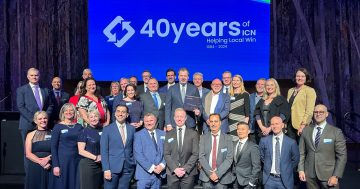
Australian Information Industry Association CEO Izzy Whitelock says multinationals and local tech companies should be partners in building an innovation ecosystem. Photo: Supplied.
Australia faces a sliding doors moment in the evolution of its technology sector. Global supply chains are shifting and digital sovereignty is becoming a priority.
One thing is clear: we won’t build sustainable capability by isolating ourselves or fragmenting efforts. The real strength comes from coordination, scale and strategic collaboration.
For too long, the debate about ‘Australian capability’ has been framed as a contest between local and global firms. This is a false choice. The modern technology ecosystem is interconnected.
Australian companies design world-class intellectual property, build cutting-edge platforms and export into global markets through a range of complex partnerships.
The question isn’t whether we support local firms – it’s how we do it in a way that makes them resilient and competitive for the long term.
Efforts by self-interested parties to divide the industry and pit national and international contributors against each other, with a ‘us v them’ mentality, undermine the astounding talent in this sector. These narratives are not only misleading but also harm industry advancement.
At the Australian Information Industry Association (AIIA), we don’t see Australian companies and multinationals as rivals. We see them as partners in building an innovation ecosystem that can scale and lead.
That means making sure local firms aren’t stuck in silos, but are part of the significant policy conversations shaping the digital economy.
Domestic capability should be front and centre, not pushed to the fringe.
True national capability is built through smart procurement, workforce development, ecosystem partnerships and investment certainty.
Smart Procurement
Government buying power can shape markets. Instead of focusing only on ownership, we need to reward outcomes – innovation, local value creation, data sovereignty and long-term national benefit. Policies that help Australian firms win work, grow and scale are much more useful than just adding labels during tenders.
Workforce Development
Technology is only as strong as the people behind it. We need robust skills pipelines, advanced training, smart migration settings and support for workforce transitions. Sovereign capability starts with sovereign talent.
Ecosystem Partnerships
From cybersecurity to AI, advanced manufacturing to digital services, our strength lies in connectedness. Australian firms thrive when they’re part of a coordinated ecosystem, startups, multinationals, research bodies, government and investors working together. Collaboration multiplies capability. Isolation weakens it.
Investment Certainty
Local companies need confidence to invest in R&D and expansion. Stable policies, predictable procurement and consistent government engagement create the conditions for innovators to become global competitors.
The mission is clear: build a confident, unified tech sector that champions local capability while embracing the global digital economy. This isn’t about diluting focus. This is about amplifying influence. When Australian companies are at the centre of policy discussions, we get coherence, alignment and impact at scale.
Australia won’t strengthen its tech capability by turning inward. We’ll do it by building smarter policies, stronger coordination and more competitive firms that can stand proudly on the world stage.
That is the future we are working towards, and one the Australian technology industry deserves.
Elizabeth Whitelock is the CEO of the Australian Information Industry Association (AIIA).











